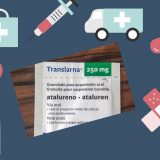Prevalência de fadiga, dor, ansiedade e depressão em adultos com distrofia muscular de Duchenne, e suas associações com a qualidade de vida
Holanda – Este estudo foi realizado com 80 adultos (acima de 20 anos) com distrofia muscular de Duchenne. Os sintomas de fadiga (40,5%), dor (73,4%), ansiedade (24%) e depressão (19%) foram frequentemente encontrados. Muitos indivíduos muitas vezes tinha várias condições. Os autores concluem que estes sintomas são muito frequentes e são tratáveis e podem melhorar a qualidade de vida. O resumo em inglês pode ser lido abaixo:
(Archives of Physical Medicine and Rehabilitation,2015) Prevalence of fatigue, pain, anxiety and depression in adults with Duchenne Muscular Dystrophy, and their associations with quality of life
Robert F. Pangalila, Geertrudis AM. van den Bos, Bart Bartels, Michael Bergen, Henk J. Stam, Marij E. Roebroeck – The Netherlands
Design: cross-sectional study
Setting: Home of participants
Participants: 80 adults with Duchenne Muscular Dystrophy
Interventions: Not applicable
Main outcome variables: Fatigue was assessed with the Fatigue Severity Scale; pain with one item of the SF-36 and by interview; and anxiety and depression, using the Hospital Anxiety and Depression Scale. Health-related quality of life was assessed using the World Health Organization Quality of Life Scale Brief Version (WHOQOL-BREF). Associations between these conditions and quality of life were assessed by means of univariate and multivariate logistic regression analyses.
Results: Symptoms of fatigue (40.5%), pain (73.4%), anxiety (24%), and depression (19%) were frequently found. Individuals often had multiple conditions. Fatigue was related to overall quality of life, and to the quality of life domains of physical health and environment; anxiety was related to the psychological domain.
Conclusion: Fatigue, pain, anxiety, and depression, potentially treatable symptoms, occur frequently in adults with Duchenne Muscular Dystrophy and significantly influence health-related quality of life.



